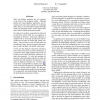Free Online Productivity Tools
i2Speak
i2Symbol
i2OCR
iTex2Img
iWeb2Print
iWeb2Shot
i2Type
iPdf2Split
iPdf2Merge
i2Bopomofo
i2Arabic
i2Style
i2Image
i2PDF
iLatex2Rtf
Sci2ools
102
click to vote
VLDB
2005
ACM
2005
ACM
Pattern Tree Algebras: Sets or Sequences?
XML and XQuery semantics are very sensitive to the order of the produced output. Although pattern-tree based algebraic approaches are becoming more and more popular for evaluating XML, there is no universally accepted technique which can guarantee both a correct output order and a choice of efficient alternative plans. We address the problem using hybrid collections of trees that can be either sets or sequences or something in between. Each such collection is coupled with an Ordering Specification that describes how the trees are sorted (full, partial or no order). This provides us with a formal basis for developing a query plan having parts that maintain no order and parts with partial or full order. It turns out that duplicate elimination introduces some of the same issues as order maintenance: it is expensive and a single collection type does not always provide all the flexibility required to optimize this properly. To solve this problem we associate with each hybrid collection ...
Related Content
| Added | 28 Jun 2010 |
| Updated | 28 Jun 2010 |
| Type | Conference |
| Year | 2005 |
| Where | VLDB |
| Authors | Stelios Paparizos, H. V. Jagadish |
Comments (0)

